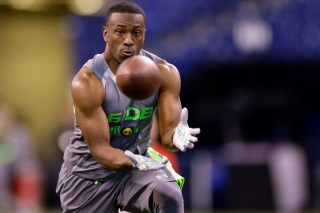By Paul Schwartz, NYPost
Nat Berhe born from Eritrean father
*”Ethiopia, Eritrea, it’s all the same, just different name.” Nate Berhe
You may or may not be able to tell a man by his tweets, but in Nat Berhe’s case, two he shot off right after he was taken by the Giants in the fifth round of the NFL Draft were revealing.
His first was a simple question: “First Eritrean in the NFL?” Not long after, he offered a glimpse into his state of mind: “I’m going to give everything I got to the Giants and everybody who passed on me … I’m coming.”
The first post prompted many responses of nationalistic support.
“As you can see on Twitter everyone is going crazy,” Nat Berhe told The Post. “I’m happy and proud of where I come from.”
Where he comes from is a place that does not produce NFL players. His father, Berhe Asfaha, was born and raised in what is now called Eritrea, a country in the Horn of Africa sitting along the Red Sea, bordered by Sudan in the northwest, Ethiopia in the south and Djibouti in the southeast. The capital city of Asmara has a population of about 650,000. Berhe Asfaha, when he was 20, immigrated to the United States, first to Texas to attend the University of Houston. He met his wife, Judy — a native of Mississippi — and the couple eventually moved to Southern California.
“I’ll be the first Ethiopian player to play in the National Football League,” said Berhe (pronounced Bur-HEY). “That’s huge for me and huge for my family and huge for the people in Ethiopia. It’s a big feat. Not a lot of people from East Africa are in the National Football League. I look at it all the same, Ethiopia, Eritrea, it’s all the same, just different name.”
A list of the most famous Eritrean athletes contains almost exclusively long-distance runners such as Ali Abdallah, Nebiat Habtemariam and Simret Sultan. Meb Keflezighi last month won the Boston marathon and is an Eritrean refugee who went to UCLA. Thomas Kelati, an American-born basketball player from Washington State of Eritrean heritage, was once with the Lakers in training camp and plays professionally in Europe.
Berhe, a California native who has never visited Africa, but plans to do so in the near future, has also posted on Twitter: “Shout out to my Habesha [those residing in the Horn of Africa] people, much love and respect. Will make you proud.
Shout out to my Habesha people, much love and respect. Will make you proud. Thank you for the support.
— Nat Berhe (@NatBerhe) May 12, 2014
Berhe’s parents own and operate five non-profit group homes in the San Bernardino, Calif., area that take in psychologically disturbed boys ages 8-15 and he says “I’ve always been involved in humanitarian-type work.”
The Giants hope what Berhe gave San Diego State can transfer to the next level even though, at 5-foot-10 and weighing in with the Giants this week at 198 pounds, he looks more like a cornerback than a safety. His timed speed is ordinary, but that did not stop him from leading his team in tackles the past two seasons. As for his lack of size, Berhe thinks that’s an overrated component, mentioning top safeties such as Earl Thomas of the Seahawks and Devin McCourty of the Patriots, who are essentially the same size as Berhe.
Berhe excelled playing the “Aztec” position, a hybrid safety-linebacker role that allowed him to blitz and offer run support, a role Marc Ross, the Giants’ vice president of player evaluation, likened to the spot Deon Grant created on the 2011 Super Bowl championship team. Berhe is not nearly as big as Grant, though, and it remains to be seen if, as a natural strong safety, he can cover capably enough and play his aggressive style and hold up physically to the rigors of the NFL.
Scouts describe Berhe as “instinctive,” and said he “plays with abandon” and has a “very likeable personality.”
Giants general manager Jerry Reese said: “We use the term ‘football player;’ this guy is one of those guys, a football player. He’s all over the place.”
Berhe admitted he had “wide eyes” last Monday walking into the Giants training facility, seeing the four shiny, silver Lombardi Trophies behind glass. Through social media, he already has felt some love and believes his East African background will resonate in this area.
“New York and New Jersey are melting pots and I’ve been hearing a lot of responses on Twitter and Instagram, people showing support,” Berhe said. “I feel like I’ll get a lot of backing down the road here.”
